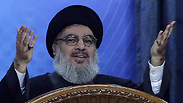
Nasrallah: Mount Dov blast was revenge for killed operative
Hezbollah leader says attack that wounded 2 IDF soldiers was response to Israel's attempt to 'test' organization with explosion that killed organization member.
Hezbollah Secretary-General Hassan Nasrallah commented for the first time on the attack on an IDF outpost on Mount Dov in the Golan Heights a week ago, saying that it was in revenge for the death of Hezbollah militant Hassan Ali Haidar.
Haider was killed in an explosion in Aadloun in Lebanon that the organization links to an Israeli intelligence device or UAV attack; two IDF soldiers were wounded in the attack on Mount Dov.
Speaking during a meeting held recently with senior Hezbollah operatives in the Beqaa Valley in Lebanon, Nasrallah stated that the attack was a "message" that indicated that "Hezbollah is still strong and present, and has not weakened, despite the changes in the region and the media's coverage of the global coalition," Lebanese newspaper Al-Akhbar quoted him as saying
Commenting on the blast that killed Haider while he was attempting to destroy an Israeli intelligence device, Nasrallah said that "Israel wanted to test Hezbollah, and our response to that was the explosive device in Mount Dov."
Following the explosion in Aadloun in September, the Lebanese Army released a statement saying that, "At 3:45pm a Lebanese Army intelligence patrol found an unidentified object near the village of Aadloun.
"When the patrol tried to reveal the nature of the object, Israel remotely detonated it, causing the death of a citizen who was nearby. The blast area was closed off for security and an investigation has been launched into the event."
According to reports in Lebanese media, Haider, 25, was a bomb expert who was killed while he and his colleagues were trying to disarm four explosives.
This was not the first time Hezbollah has taken responsibility for attacks in Mount Dov. Defense establishment officials believe that much like the previous incident in the area last year, Hezbollah took advantage of the tricky terrain and the fact there is no border fence at the mountain's extensions to plant the explosives and detonate them from afar.
Israel and Lebanon are technically at war but their 80-km (50-mile) border has been largely quiet since the 2006 conflict.
Hezbollah members have been fighting alongside forces loyal to President Bashar Assad in Syria's civil war. The move by Hezbollah, which is backed by Shi'ite Iran, has helped turn the tide of the war in Syria against insurgents seeking to oust Assad.
The group said it took the decision to fight in Syria to prevent jihadi fighters, like those from Nusra Front and Islamic State which seized parts of Syria and Iraq, from advancing into Lebanon.
AP contributed to this report.










